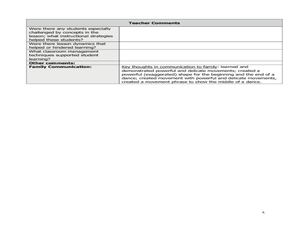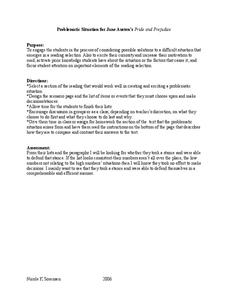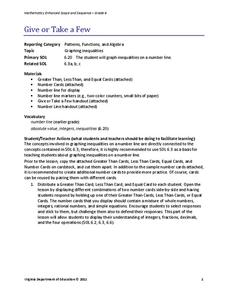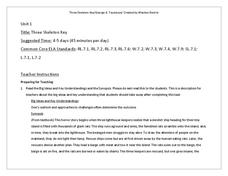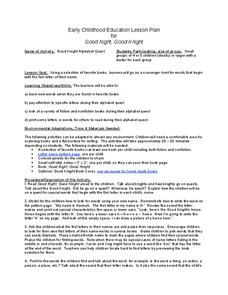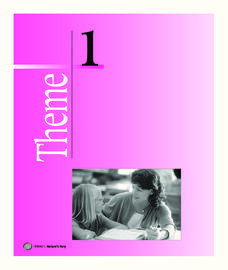Curated OER
Fix the Problem!
People won't let me finish talking!...I hate the lunch room...Leave my name alone! Explore a variety of problems learners can face on a daily basis, and use this game to have pupils determine the best ways to answer those situations.
Curated OER
Dance and Writing
Fourth graders use dance moves to perform narratives. In this dramatic performing lesson, 4th graders use strong and soft movements to show what character's voice is portraying. Students also use movement to show the feelings in the...
Curated OER
No Name Calling Week
The lessons learned during No Name Calling Week can last throughout the year.
Curated OER
Alicia Keys, Songs in A Minor
How do a person's musical preferences influence the way they compose music of their own? Learners analyze the sound and lyrics of Alicia Keys in relation to musicians that came before. Jazz, blues, and soul music from the past are shown...
Scholastic
Presenting Persuasively (Grades 6-8)
Teens and pre-teens are a prime target for advertisers, so how are they doing it? An interactive lesson highlights the strategies used by advertisers, such as visual imagery and verbal clues. Then, a short writing assignment puts those...
Texas Instruments
Collaborating on Flashback
Explore a flashback in a story with readers. They will read a story, identify the flashback in the story, then evaluate how the flashback is used. Using the NoteFolio, students analyze the meaning and merit of a flashback in a story....
Curated OER
Holocaust Studies: Five Poems by Dan Pagis
Teaching a unit on the Holocaust? Consider using the personal statements of Dan Pagis’s poetry to contrast with the more “distanced” historical accounts found in textbooks. Five poems, discussion questions, and background notes are...
Curated OER
Pride and Prejudice: Problematic Situation
What would you do if your sister ran off with a man whom you didn't trust? Explore a scenario based on Jane Austen's Pride and Prejudice. Once kids work though the problem, they read the appropriate chapters from the book and write a...
Scholastic
Tell Us a Tale: Teaching Students to Be Storytellers
Encourage scholars to retell their favorite short story or folktale, adding personal details to make it their own. After reading their book of choice several times, story tellers retell a tale verbally to their classmates.
Virginia Department of Education
Give or Take a Few
Young mathematicians extend their knowledge of rational numbers on a number line to graph inequalities by first using number cards to compare rational numbers. They finish by using similar reasoning to graph inequalities on a number line.
Curated OER
The Producers
Students design attractive posters to promote the work of Leroy Anderson, an American composer with an unusual style.
Curated OER
An Untold Triumph
Middle schoolers examine and analyze the history and experience of Filipinos in Hawaii and California. They identify the contributions of Filipino Americans to the US war effort in World War II, and analyze the many causes that led to...
Curated OER
Introducing the Memo
Examine the text structure of a memo with this worksheet. Eighth to twelfth graders decide if the purpose of a memo is to motivate an action or to provide information to the reader. They explore new vocabulary and make predictions prior...
Curated OER
Exaggerated Poetry
Students use physical poses and vocal choices to create emphasis in communication. In this exaggerated Poetry lesson, students use physical movement and vocal choices to exaggerate an expression make a connection between literary content...
Curated OER
Historical Agency in History Book Sets (HBS)
Study historical events by combining the study of historical fiction and non-fiction. Learners read about true past events in historical fiction novels and then research non-fiction accounts of the same events. What are some differences...
Curated OER
Phoneme Segmenting Accuracy
Take your kindergartners on a journey to the mythical planet Paz where residents segment words into phonemes, touching parts of their arm with each sound. This physical response to phoneme segmenting will appeal to your physical learners...
Curated OER
Banned Book Week: Tips for Teaching Censorship
Consider how book censorship erodes our right to free speech and intellectual freedom.
Scholastic
What Happened Next? (Grades K-4)
Explore the structure of narrative writing with this fun, collaborative lesson. Start by reading aloud a short story, asking small groups of learners to fill in key events on a large story board prepared on the class whiteboard....
Washoe County School District
Three Skeleton Key
Conduct a close reading of George G. Toudouze's well-known horror story "Three Skeleton Key." This plan breaks up the reading into several steps and provides text-dependent questions to ask along the way. Learners will have the chance to...
Curated OER
Night: Vocabulary Activity, Magic Square
As part of a study of vocabulary found in Elie Wiesel's Night, readers complete a magic square using the provided words and their definitions.
Penn State
Early Childhood Education Lesson Plan for Good Night, Good Knight
The book Good Night, Good Knight is the inspiration for this plan. Learners get into small groups to search for words in books that begin with their names and fill out and illustrate their own personal letter and name pages.
Houghton Mifflin Harcourt
Nature’s Fury: Extra Support Lessons (Theme 1)
Earthquakes, hurricanes, volcano eruptions, and more. To enrich their study of nature's big events, kids map tectonic plates and major earthquake locations, identify emergency response agencies, and storyboard a film about volcanos.
Channel Islands Film
Once Upon a Time (Sa Hi Pa Ca): Lesson Plan 3
What was the most significant tool used by the Chumash? How did the environment make the tool possible? What group behaviors allowed the Chumash be be successful for thousands of years? After watching West of the West's documentary Once...
Curated OER
Inner Circle/Outer Circle Debate Strategy
Arranged in facing concentric circles, half the class discusses an issue. The other half of the class takes notes which are then used to fuel a class discussion and to prepare editorial opinions on the topic at hand. So much emphasis is...



